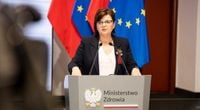The Polish healthcare system is set to undergo a significant transformation with the launch of the "Moje Zdrowie" program, which replaces the previous "Profilaktyka 40 Plus" initiative. Starting on May 5, 2025, this new program aims to provide comprehensive health assessments for adults over 20 years of age, making it accessible to a broader population than ever before.
According to Minister of Health Izabela Leszczyna, the "Moje Zdrowie" program is designed to encourage Poles to take their health seriously by participating in regular preventive check-ups. "We are accustomed to periodic preventive examinations for children and adolescents. However, adults often forget to care for their own health in the same way," she said, emphasizing the need for a cultural shift towards proactive health management.
The new program is expected to benefit approximately 30 million Poles. Unlike its predecessor, which focused primarily on individuals aged 40 and older, "Moje Zdrowie" opens the door for younger adults, including those as young as 20. This inclusive approach aims to instill a habit of regular health evaluations among the entire adult population.
Participants in the program will undergo a health assessment every five years if they are between the ages of 20 and 49, and every three years for those over 49. This systematic approach is intended to facilitate early detection of various health issues, including cardiovascular diseases, cancer, diabetes, and mental health disorders.
The health assessment consists of several key components: participants will complete a questionnaire either online through the Internet Patient Account (IKP) or at a primary healthcare facility (POZ). This questionnaire will cover lifestyle factors, family medical history, and any existing health concerns. Based on the responses, patients will be referred for necessary diagnostic tests, which must be completed within 30 days.
The basic diagnostic tests included in the program encompass blood morphology, glucose levels, creatinine (with estimated glomerular filtration rate), lipid profiles (total cholesterol, LDL, HDL, and triglycerides), thyroid-stimulating hormone (TSH), and a general urine test. Depending on the individual's age and health questionnaire responses, additional tests may include liver enzyme levels, prostate-specific antigen (PSA) tests for men, and screening for hepatitis C.
Dr. Michał Sutkowski, president of the Warsaw Family Physicians Association, highlighted the importance of early intervention, stating, "Interventions undertaken at such an early stage yield far better outcomes." He also noted that the program aims to create a culture of health awareness and responsibility among Polish citizens.
Julia Mielcarek, a psychology student, shared her personal experience with early detection through routine blood tests. At 18, she discovered she had acute myeloid leukemia after routine blood work revealed alarming signs. "Early detection of any disease allows for early treatment to begin," she emphasized, advocating for the importance of regular health screenings.
While the "Moje Zdrowie" program is a significant step forward, some experts express concerns about its potential effectiveness. Marta Bednarek from the "Rak'n'Roll" foundation noted that many patients are still unaware of the program, which could hinder its success. "Patients do not know much about this program, or they know very little," she stated, indicating a need for better public outreach and education.
The Polish government has allocated a substantial budget of 9.698 billion PLN for the program over the next ten years, reflecting its commitment to improving public health. This funding is expected to cover the costs of the comprehensive tests offered under the program, which could otherwise range from 230 PLN to nearly 500 PLN depending on the tests required.
As the launch date approaches, the Ministry of Health is tasked with ensuring that the information reaches as many citizens as possible. The program will be implemented across all primary healthcare facilities, making it easier for individuals to access the necessary screenings and consultations.
In summary, the "Moje Zdrowie" program represents a significant advancement in Poland's public health strategy, aiming to foster a culture of preventive care among adults. With its broad eligibility criteria and comprehensive health assessments, it seeks to empower individuals to take charge of their health and well-being.
As the healthcare landscape in Poland evolves, the success of the "Moje Zdrowie" program will depend not only on its implementation but also on the willingness of the public to engage with preventive healthcare measures. The upcoming months will reveal how effectively the program can mobilize the population towards a healthier future.






